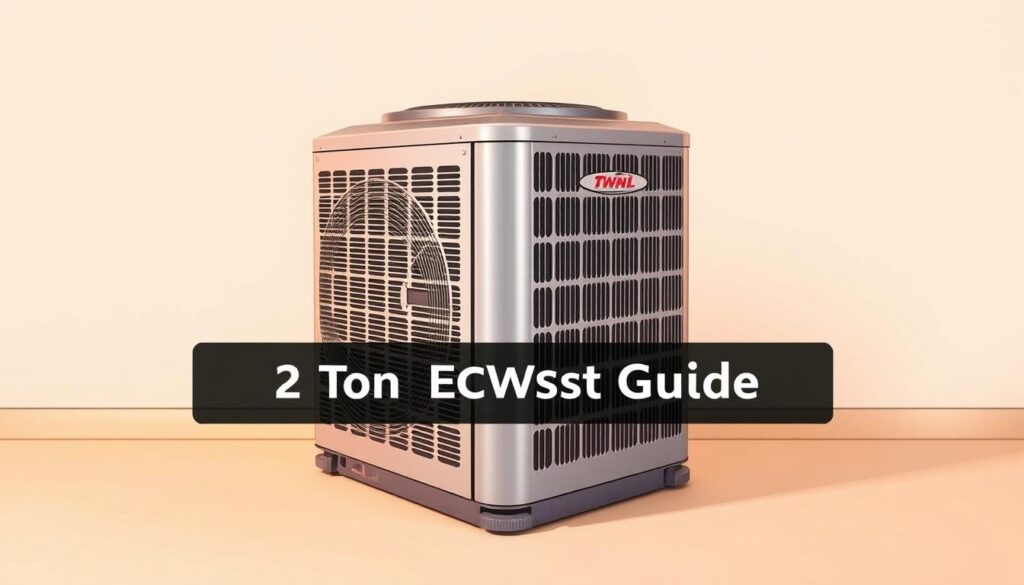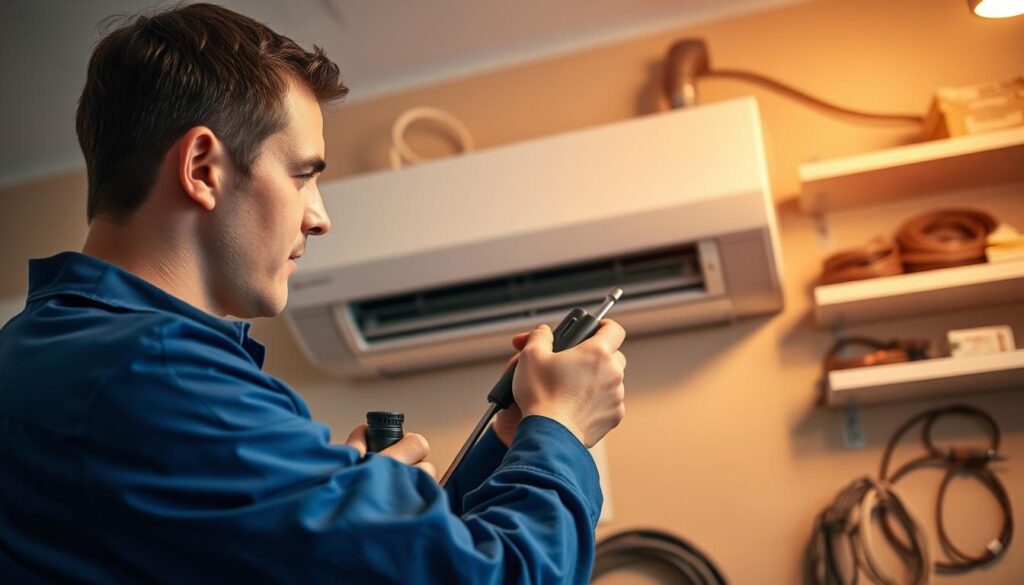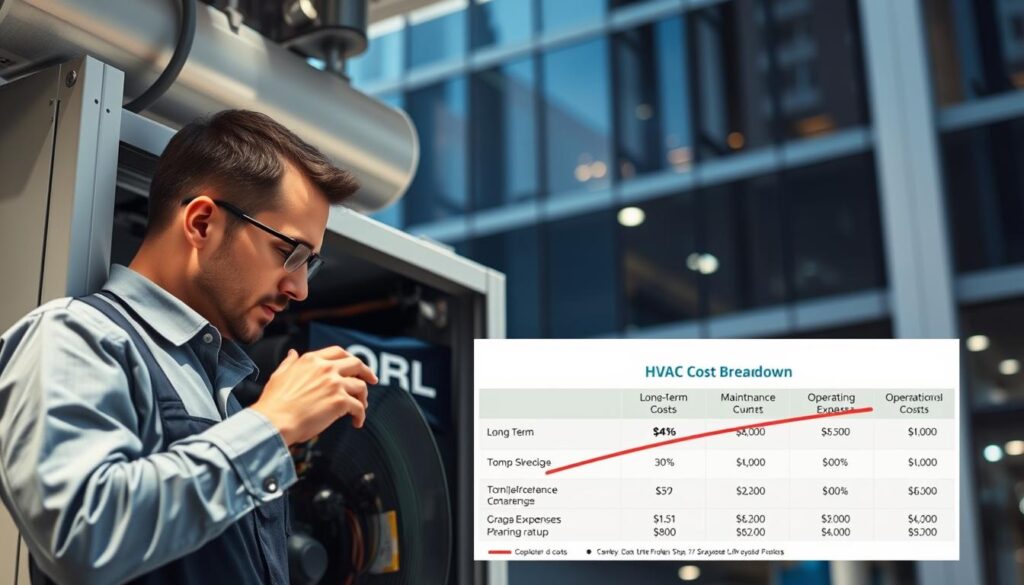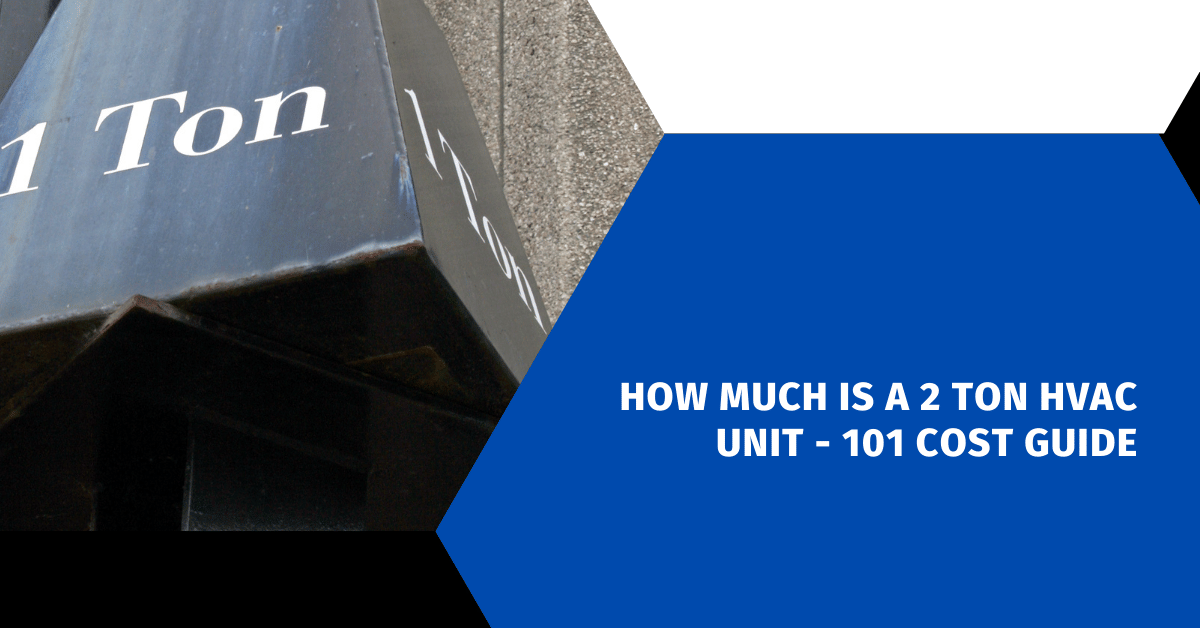Affiliate Disclosure
HVAC Guide Guys is a participant in the Amazon Services LLC Associates Program, an affiliate advertising program designed to provide a means for sites to earn advertising fees by advertising and linking to Amazon.
Are you curious about the cost of a 2 ton HVAC unit for your home? Getting a new HVAC system can seem like a big financial challenge. Prices can really affect your budget.

The average cost for a 2 ton HVAC installation is between $4,940 and $18,854. Most people spend about $8,551 for a full system replacement. Knowing how HVAC prices work can help you choose wisely, balancing cost and performance.
This guide will cover everything you need to know about buying a 2 ton HVAC unit. We’ll look at pricing, installation, and how to get the most value. You’ll learn how to keep your home comfortable without breaking the bank.
Key Takeaways
- National average cost for 2 ton HVAC unit ranges from $4,940–$18,854
- Typical homeowner spends approximately $8,551 for complete replacement
- Multiple factors influence overall HVAC installation cost
- System efficiency can impact long-term expenses
- Professional assessment helps determine precise unit requirements
Table of Contents
Understanding HVAC Unit Sizing and Capacity
Finding the right size for your home cooling system is key for comfort and saving energy. An ac unit size calculator is a must-have for finding the perfect fit. The size of your HVAC unit affects your home’s cooling and comfort.
Prices for home cooling systems vary a lot, depending on the unit’s size and needs. Knowing how to choose the right AC unit can save you money and avoid cooling problems.
What BTUs Mean for Cooling Power
British Thermal Units (BTUs) show how much heat an air conditioner can take out in an hour. For most homes, a good rule is:
- 1 ton of cooling = 12,000 BTUs
- 2 ton AC unit = 24,000 BTUs
- Typical coverage: 1,000-1,400 square feet
Square Footage and Cooling Requirements
Your home’s size is key in picking the right AC unit size. Undersized units work harder and use more energy. Oversized units turn on and off too much, which lowers efficiency.
“Proper sizing is the key to optimal cooling performance and energy savings.” – HVAC Professionals
Climate Zone Considerations
Different areas need different cooling methods. The US Department of Energy suggests specific BTU calculations for your local climate zone. This ensures your cooling system fits your area’s temperature and humidity.
Talking to a pro can help you figure out the best HVAC unit size for your home. They can find a cost-effective solution for you.
Average Cost Range for 2 Ton HVAC Systems
When planning to get a new AC system, knowing the cost of a 2-ton unit is key. Prices for these systems usually fall between $3,500 and $7,500, including installation. This range helps you plan your budget for cooling your home.
The total cost includes several important parts:
- AC Unit Cost: $2,000 to $4,000
- Labor Expenses: $1,000 to $2,000
- Additional Materials: $500 to $1,500
Several factors can affect the price of your air conditioning unit:
- Brand reputation
- Energy efficiency ratings
- Regional installation costs
- Home complexity
Pro Tip: Always ask for multiple quotes for your new AC system. This way, you can find the best deal. Professional HVAC contractors can give you a detailed estimate that fits your home’s needs.
Professional installation ensures optimal performance and longevity of your HVAC system.
Explore Our HVAC Shop
Looking for top-rated HVAC tools, parts, and accessories? Visit our shop and find the perfect solution for your needs.
Visit the ShopFactors That Influence Installation Costs
When you’re planning to replace your AC, knowing what affects hvac contractor rates is key. The cost of a new HVAC system is more than just the equipment. It involves many complex factors.
Several important elements affect the total cost of your HVAC installation:
- Complexity of installation
- Local labor rates
- Permit requirements
- Geographic location
- Seasonal pricing fluctuations
Labor and Permit Expenses
Labor costs can vary a lot based on where you live and the specific needs of your AC replacement. Professional rates usually range from $75 to $250 per hour. Permits add to the cost, usually between $250 and $500, based on local rules.
Geographic Location Impact
Your location greatly affects installation costs. Cities with higher costs of living have more expensive rates than rural areas. Climate zones also play a part, with contractors in extreme climates charging more.
Seasonal Price Variations
HVAC installation prices change a lot throughout the year. Summer and winter are peak seasons with higher rates. Installing in spring or fall can save you 10-20%.
Pro tip: Always get multiple quotes and compare hvac contractor rates to ensure you’re getting the best value for your investment.
How Much Is a 2 Ton HVAC Unit for Different Brands
Looking for a 2 ton HVAC unit? It’s key to know how prices vary by brand. The cost of a central air conditioner can change a lot based on the brand you pick.
Premium brands offer top-tier performance but come with a higher price tag:
- Carrier: Known for exceptional quality and reliability
- Trane: Offers advanced technology and durability
- Lennox: Provides high-efficiency systems with innovative features
Budget-friendly options provide more affordable solutions for your how much is a 2 ton hvac unit question:
- Goodman: Offers cost-effective units with decent performance
- York: Provides reliable systems at a lower price point
- Frigidaire: Delivers basic cooling solutions for budget-conscious homeowners
Price ranges for 2 ton HVAC units typically break down as follows:
- Budget Brands: $2,500 – $4,000
- Mid-Range Brands: $4,000 – $6,000
- Premium Brands: $6,000 – $8,500
While upfront costs are important, choosing a quality brand can save you money. This is because they use more energy efficiently and last longer. Your home needs and budget will help you decide which brand is best for you.
Explore Our HVAC Shop
Looking for top-rated HVAC tools, parts, and accessories? Visit our shop and find the perfect solution for your needs.
Visit the ShopEnergy Efficiency Ratings and Cost Implications
When picking a cooling system, knowing about energy efficiency is key. Today’s energy efficient ac units have ratings that help you choose wisely. The SEER2 standard is the latest, showing how well your system works and how much you can save.
SEER2 Ratings Explained
SEER2 (Seasonal Energy Efficiency Ratio) shows how well your air conditioner uses electricity. A higher rating means it uses less energy and works better. SEER2 ratings go from 13 to 26, with higher numbers being more efficient.
- 13-15 SEER2: Standard efficiency
- 16-20 SEER2: High efficiency
- 21-26 SEER2: Premium efficiency
Long-term Savings
Choosing a high-efficiency unit can lower your cooling costs over time. A unit with a higher SEER2 rating might cost more at first. But, it can save you hundreds on your electricity bills each year.
Energy experts say to pick a unit with at least 16 SEER2 for the best balance of cost and savings.
Think about your local weather and energy prices when picking an air conditioner. In hot areas, a high-efficiency unit can save you money faster by using less energy.
Installation Requirements and Considerations

Replacing your AC is more than just a swap. It needs special skills and deep knowledge. This is beyond what most DIY projects require.
When you think about the cost of HVAC installation, remember a few key things:
- EPA certification for refrigerant handling
- Electrical system compatibility
- Proper permit acquisition
- Ductwork evaluation and possible changes
Trying to install it yourself can be risky. It might:
- Void the warranty
- Make your home unsafe
- Lower your system’s efficiency
- Lead to expensive fixes later
Professional HVAC installers are key. They ensure your system works well and safely. They know local rules, understand your cooling needs, and install it right to save you money.
| Installation Requirement | Professional Expertise Needed |
|---|---|
| Refrigerant Handling | EPA Certification |
| Electrical Connections | Licensed Electrician Skills |
| Ductwork Assessment | HVAC System Design Knowledge |
| Permit Acquisition | Local Regulatory Compliance |
Choosing professional installation is a smart move. It keeps your AC running well for a long time.
Explore Our HVAC Shop
Looking for top-rated HVAC tools, parts, and accessories? Visit our shop and find the perfect solution for your needs.
Visit the ShopComparing Different System Types and Their Costs
Choosing the right cooling system for your home is key. The cost of a central air conditioner and a new AC system varies a lot. Each system has its own benefits and challenges for homeowners.
There are three main cooling system types to consider. They can affect how much you spend:
Heat Pump Systems
Heat pumps control your home’s temperature well. They can cool and heat, making them energy-smart. The cost for heat pumps is usually between $4,000 and $7,500, based on your home’s size and needs.
- Great for mild climates
- Uses less energy
- Works for both heating and cooling
Traditional AC Units
Many people choose traditional air conditioning. These units just cool your space. The cost for a new AC system is often between $3,500 and $6,000.
- Provides reliable cooling
- Has lower initial costs
- Works with most furnaces
Dual Fuel Systems
Dual fuel systems mix a heat pump with a gas furnace. This combo offers top energy efficiency in various temperatures.
| System Type | Average Cost | Energy Efficiency |
|---|---|---|
| Heat Pump | $4,000 – $7,500 | High |
| Traditional AC | $3,500 – $6,000 | Moderate |
| Dual Fuel | $6,000 – $10,000 | Very High |
Choosing the right system means weighing costs, energy savings, and climate needs. Talking to an HVAC expert can guide you to the best choice for your home.
Home Features That Affect HVAC Unit Selection
Choosing the right cooling system for your home is more than just looking at square footage. Your home’s special features are key to finding the best ac unit size calculator for you.
Several important home features affect your HVAC unit choice:
- Insulation Quality: Bad insulation means you’ll need more cooling
- Ceiling Height: Higher rooms need stronger cooling systems
- Window Placement and Sun Exposure: Sunlight on windows adds heat
- Ductwork Condition: Poor ducts can make your system less efficient
When using an ac unit size calculator, remember these important factors. Homes with big windows facing south or west need more cooling. Older homes with little insulation might need a bigger unit to stay cool.
Your home’s unique features can greatly affect cooling system prices. A professional can help find the most cost-effective and efficient HVAC solution for your home.
Pro Tip: A thorough home energy audit can give you exact insights into your cooling needs and what system you might need.
Explore Our HVAC Shop
Looking for top-rated HVAC tools, parts, and accessories? Visit our shop and find the perfect solution for your needs.
Visit the ShopMaintenance Costs and Long-term Investment

Buying an HVAC system is more than just the initial cost. Knowing the long-term value of your energy efficient ac units helps you make better choices for your home’s comfort.
Keeping your HVAC system in good shape is key. Experts say to get annual professional checks to keep it running well. These inspections can stop expensive repairs and sudden failures.
- Annual maintenance costs range from $150 to $300
- Regular tune-ups can extend system life by 5-10 years
- Preventative care reduces overall hvac installation cost
Most HVAC systems last 15-20 years. Choosing high-quality, energy efficient ac units can save you money in the long run. Even though they might cost more at first, they often use less energy and save you money on bills.
| Maintenance Level | Estimated Yearly Cost | System Lifespan Impact |
|---|---|---|
| Minimal Maintenance | $50-$100 | 10-12 years |
| Regular Professional Service | $150-$300 | 15-20 years |
| Comprehensive Care | $300-$500 | 20+ years |
Viewing your HVAC system as a long-term investment can pay off. It helps you save on energy, avoid surprise repairs, and keep your home comfortable for years.
Warranty Coverage and Brand Reliability
When you buy a central air conditioner, knowing about warranty coverage is key. It affects your long-term costs. Different brands offer different levels of protection, helping you avoid high repair bills and hvac contractor rates.
Choosing the right warranty gives you peace of mind. Look for warranties that cover more than the usual period.
Manufacturer Warranties Explained
Warranty options vary by brand. Some brands offer stronger protection than others. Here are important things to look at:
- Compressor warranty duration
- Parts coverage period
- Labor warranty terms
- Transferability of warranty
Extended Coverage Options
Many HVAC makers and contractors have extended warranty plans. These plans offer extra protection beyond the standard warranty. They usually include:
- Comprehensive parts coverage
- Extended labor warranty
- Preventative maintenance agreements
- Full system replacement options
Top brands like Trane, Carrier, and Lennox have strong warranty programs. For example, Trane offers a 12-year warranty on compressors and 10 years on parts for registered units.
Pro tip: Always register your HVAC unit with the manufacturer to ensure full warranty protection and possible extended coverage benefits.
When looking at warranties, think about the long-term savings. A higher initial cost for a unit with a good warranty can save you a lot on repairs and replacements.
Explore Our HVAC Shop
Looking for top-rated HVAC tools, parts, and accessories? Visit our shop and find the perfect solution for your needs.
Visit the ShopWays to Save on Your HVAC Purchase
Lowering your new ac system estimate is easier than you think. Smart homeowners can save a lot by planning and doing research.
First, look into utility company rebates. Many electric providers give big incentives for installing energy-saving HVAC systems. These rebates can be from $300 to $1,500, based on the system’s efficiency.
- Request multiple quotes from licensed contractors
- Compare pricing during off-peak seasons
- Check manufacturer and local government incentives
- Consider bundled HVAC service packages
When to buy matters a lot for your HVAC investment. Installing in fall or winter can save on labor costs. Contractors often have less work then, which can mean better prices for your new ac system.
Choosing energy-efficient systems can save money in the long run. Look for units with high SEER2 ratings. They might cost more upfront but save on energy bills later. Some makers offer rebates or tax credits for these models.
Pro tip: Improve your home’s insulation before installing a new system. This could make your new unit smaller and save on costs.
Don’t forget to check for local and federal tax credits for energy-saving home upgrades. These can help with the cost of a new HVAC system.
Conclusion
Choosing the right 2-ton HVAC unit for your home is important. You need to think about your home’s size, the local weather, and how much energy you want to save. This helps you find a system that fits your needs and saves money in the long run.
It’s not just about the price of a 2 ton HVAC unit. You should also look at how efficient it is, how well it’s installed, and any long-term benefits. These systems usually cost between $3,500 and $7,500. The price can change based on the brand, how hard it is to install, and where you live.
Getting advice from a professional can help you make a better choice. They suggest looking for systems that use less energy and come with good warranties. By considering things like SEER ratings, your home’s size, and the local weather, you can find a system that cools well and saves you money.
Your goal is to make your home comfortable and cool without using too much energy. Take your time to research and talk to experts. This way, you can choose the best HVAC system for your home and enjoy it for many years.

